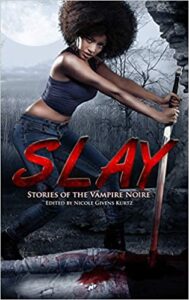A note from the editor:
We are midway through October and Monster Librarian still needs to raise the funds to pay for our hosting fees and postage in 2021. If you like what we’re doing, please take a moment to click on that red “Contribute” button in the sidebar to the right, to help us keep going! Even five dollars will get us closer to the $195 we need to keep going at the most basic level. We have never accepted paid advertising so you can be guaranteed that our reviews are objective. We’ve been reviewing and supporting the horror community for 15 years now, help us make it another year! Thank you! And now, our review of SLAY: Stories of the Vampire Noire edited by Nicole Givens Kurtz.
SLAY: Stories of the Vampire Noire edited by Nicole Givens Kurtz ( Bookshop.org | Amazon.com )
Mocha Memoirs Press, 2020
ISBN-13 : 978-1735219554
Available: Hardcover, paperback, Kindle edition
The late L.A. Banks’ Vampire Huntress series, and her ability to transform common tropes of vampire fiction into stories that reflected the African-American experience, inspired many of the authors in SLAY: Stories of the Vampire Noire. Anthology editor Nicole Givens Kurtz continues that tradition here by showcasing Black writers and their imaginings of vampires, slayers, and hunters through their stories, giving Black readers the opportunity to be seen in vampire fiction that takes on the standard Eurocentric tropes and transforms them in a way that is uniquely relevant to Black people and also provides a window for other readers into what they have been missing because of the limited perspective of most vampire fiction. The stories come from all over the African diaspora, but the majority of them are by authors from the United States and Britain. Authors take various approaches to the concept of vampirism, inspired by Black culture, mythologies, history, and experiences, but there is nothing boring here. Interspersed between stories are beautifully calligraphed obituaries.
In the section of stories from the United States and Britain, strong stories include “Dessicant”, by Craig Laurance Gidney, takes place in a badly-kept up low-income apartment building that has red dust in the vents that is making its occupants sick and draining them of fluids. The negligent landlord can’t be reached and the protagonist, a Black trans woman ostracized by other residents, has to find a way to combat the dust, or whatever it is, on her own. “The Retiree”, by Steven Van Patten, is a funny, heartbreaking story that will give readers a new perspective on what goes on in a retirement home In “The Dance”, by L. Marie Wood, the protagonist is surprised to learn there is more to her sexuality than she realized. In “A Clink of Crystal Glasses Heard”, by LH Moore, Neeka and her friends have a coming-of-age ceremony planned by their mothers that is not what they expected. “Diary of a Mad Black Vampire”, by Dicey Grenor, puts the reader in the head of a bored, lonely and vicious Black vampire who finds herself intrigued by a fragile-seeming albino white girl. “The Last Vampire Huntress”, by Alicia McCalla, remixes the story of Kendra the Vampire Slayer, with Kendra the reluctant, prophesied, last vampire huntress who must accept her destiny and kill her vampire boyfriend after he attacks her friends. “Unfleamed”, by Penelope Flynn, tackles race and violence in the Victorian era with its take on the Dracula story. “Di Conjuring Nectar of di Blood” , by Kai Leakes, is a gorgeously written historical story of love and generational trauma. In “Snake Hill Blues”, set in 1927, conjure woman Mamma Lucy eliminates a vampire who has been preying on dancing girls. I hope this author will bring her back in other stories!
The stories from African authors are also strong. A few that stuck out to me included Oghenechovwe Donald Ekpeki’s “Attack on University of Lagos Law Faculty”, an entertaining story narrated by a pompous, egotistical law student who finds himself in the surprising position of vampire slayer, and “His Destroyer”, by Samantha Bryant, is a powerful rendering of the Passover story from the point of view of the avatar of the Angel of Death. “Quadrille” is an engaging and occasionally darkly humorous story about friendship narrated by a vampire who has become a reporter in conflict zones in order to cover up his feeding habits, abetted by a djinn and a shapeshifter.
A last section contains stories about the future. These stories aren’t really horror, but they are compelling. In “Bloodline” scientists make a terrible mistake, enhancing a vampire’s powers. “Message in a Vessel” is a science fiction story about the consequences of human enslavement to vampires, and “Blood Saviors” is a more fantasy-oriented tale in which an investigator for the vampires’ council discovers that a vampire has been enslaving and draining earth elementals to make a rejuvenating serum for humans, whose blood has become polluted, leading to vampires getting sick.
This is a great collection overall, with fresh takes on vampire lore that I really haven’t seen elsewhere, informed by Black experiences and perspectives. There’s enough here to love that it has taken me much longer than I expected to write this review. If you love vampire fiction or horror anthologies, and want to support Black authors, publishers, and readers of horror you should definitely pick this up. It’s a great way to discover some really talented Black writers, if you haven’t already. Highly recommended.
Contains: Animal killing, body horror, blood-drinking, torture, scientific experimentation, mutilation, murder, gore, violence, sexual situations, racism, sexual assault, rape, dehumanization, insects, genocide.











Follow Us!